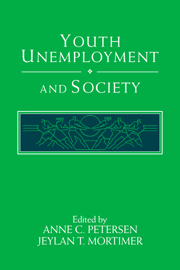Book contents
- Frontmatter
- Contents
- Contributors
- Foreword
- Introduction
- I INVESTMENT IN YOUTH
- II MACROSOCIAL PERSPECTIVES
- III INDIVIDUAL PERSPECTIVES
- 6 Concepts of causation, tests of causal mechanisms, and implications for intervention
- 7 Individual differences as precursors of youth unemployment
- 8 The psychosocial consequences of youth unemployment
- IV SOCIAL CONSEQUENCES AND INTERVENTIONS
- V IMPLICATIONS FOR RESEARCH
- Index
7 - Individual differences as precursors of youth unemployment
Published online by Cambridge University Press: 05 May 2010
- Frontmatter
- Contents
- Contributors
- Foreword
- Introduction
- I INVESTMENT IN YOUTH
- II MACROSOCIAL PERSPECTIVES
- III INDIVIDUAL PERSPECTIVES
- 6 Concepts of causation, tests of causal mechanisms, and implications for intervention
- 7 Individual differences as precursors of youth unemployment
- 8 The psychosocial consequences of youth unemployment
- IV SOCIAL CONSEQUENCES AND INTERVENTIONS
- V IMPLICATIONS FOR RESEARCH
- Index
Summary
Unemployment can be usefully examined from a variety of disciplinary perspectives. Economists and sociologists generally focus on levels of unemployment, either in the society as a whole or in particular regions, industries, or population segments. Unemployment rates are viewed as the result of macrosocietal forces, such as technological changes, migratory patterns, monetary policies, economic cycles, or the operations of the world economy. According to this perspective, individual attributes, especially those that reflect human capital investment (e.g., education and experience), will influence the degree of success in obtaining employment, given their impact on a job seeker's placement in the employment queue. Moreover, stable “tastes for employment” will influence the propensity to seek work.
Psychologists tend to focus on other characteristics that people bring to the employment market, especially values, self-concepts, motivations, and psychological well-being, that could predispose them to become unemployed. These characteristics are usually viewed as quite stable and as sources of variability in both work-related behaviors and the ability to maintain employment over a period of time. Still, experiences of unemployment and work are acknowledged by many sociologists and psychologists as sources of personal change. Operating under the assumption that unemployment is largely dependent on external forces, but maintaining the psychological focus on the individual, social psychologists have studied its personal consequences, as unemployment is seen as a source of economic and social strain with manifold psychological and behavioral implications.
- Type
- Chapter
- Information
- Youth Unemployment and Society , pp. 172 - 198Publisher: Cambridge University PressPrint publication year: 1994
- 9
- Cited by



